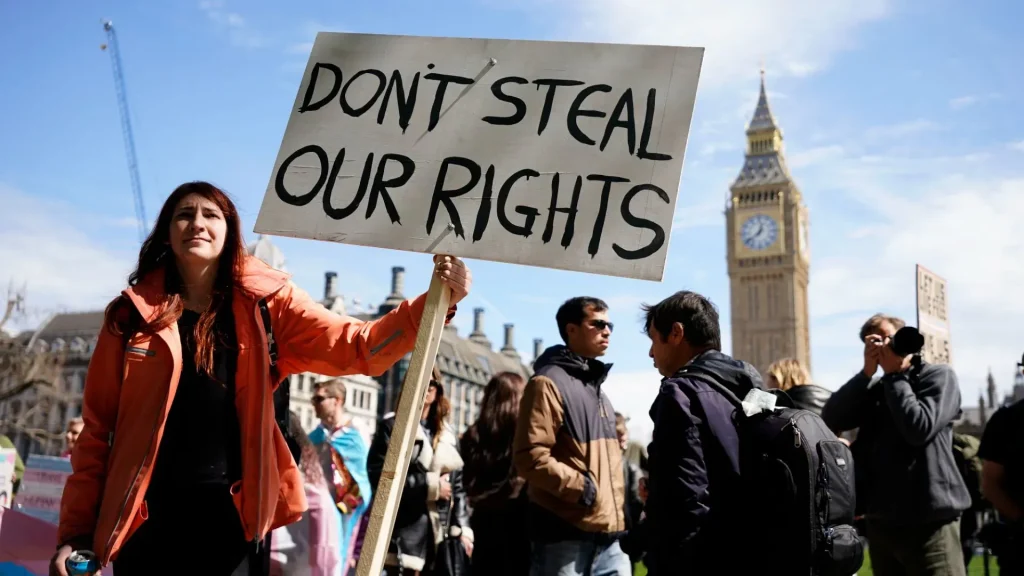The recent U.K. Supreme Court ruling on trans women rights has ignited a fiery debate across the nation, stirring emotions and raising significant questions about transgender rights and their implications. This landmark decision, which defines a “woman” strictly in terms of biological sex, has left advocates and supporters working tirelessly to address the emerging human rights issues faced by transgender individuals. The ruling’s impact stretches beyond the realm of sports, affecting vital aspects of life including access to changing rooms, hospital beds, and even domestic violence shelters. As the conversation around trans women participation continues to evolve, many fear that this setback could hinder progress previously made in the fight for equality. With the surge in transgender hate crimes further complicating the landscape, it’s crucial for society to reflect on how best to reconcile legal definitions with the inclusion of transgender athletes and their rights in various sectors.
In the wake of the U.K. Supreme Court’s recent decision regarding the rights of transgender women, the landscape of gender equality and inclusivity faces a challenging transformation. The ruling, which has garnered widespread attention, highlights critical issues surrounding the participation of trans women in various facets of society, from athletics to public facilities. Advocates for transgender equality are now confronted with navigating the complexities of legal standards and societal acceptance, all while pressing forward in the quest for comprehensive human rights solutions. This landmark case not only emphasizes the need for nuanced dialogue but also illustrates the ongoing struggle for visibility and recognition in a world grappling with changing definitions of gender. With the implications reverberating through sports and beyond, the conversation around transgender representation remains more vital than ever.
Impact of the U.K. Supreme Court Ruling on Trans Women Rights
The recent U.K. Supreme Court ruling, which defined the legal parameters of a woman based on biological sex, has sent shockwaves through the community advocating for transgender rights. Particularly, this decision significantly affects trans women, limiting their access to various public spaces and services, including changing rooms and domestic violence shelters. As a result, advocates argue that this ruling not only undermines the progress made in recognizing transgender identities but also poses serious human rights issues that affect the dignity and safety of trans individuals.
With the ruling, organizations such as the Equality and Human Rights Commission (EHRC) have struggled to navigate the complex landscape of gender identity and rights. Their initial guidance, stating that trans women should not access women’s facilities, highlighted the tension between safeguarding women’s spaces and upholding human rights for transgender individuals. This conflict has resulted in a rollback of certain previous protections for transgender people and has intensified discussions around how to better integrate transgender rights within the existing framework of women’s rights in the U.K.
Trans Women Participation in Sports and Its Ramifications
The ruling has had an immediate consequence in the world of sports, especially regarding trans women participation. Following the Supreme Court’s decision, numerous sporting bodies have altered their policies, effectively banning trans women from competing in women’s categories. This has left many athletes, like Billie Sky Walker, feeling marginalized and voicing their confusion regarding their exclusion from spaces they have fought to be part of, leading to widespread heartbreak within the community.
This situation not only raises questions about fairness in competition but also touches on broader issues of inclusivity and acceptance within sports. The notion of fairness for cisgender athletes versus the rights of transgender athletes creates a challenging dynamic that governing bodies are grappling with. The decision to exclude trans women from female categories in sports has resulted in advocacy for significant reforms, as many argue that sports should be a space that celebrates diversity rather than restricts it based on gender identity.
The ongoing discourse highlights the need for more compassionate and informed approaches to managing sports eligibility criteria, navigating the intricacies of biological differences while respecting the identities of all athletes.
Changing Perspectives on Transgender Rights in the U.K.
The evolving conversation surrounding transgender rights in the U.K. mirrors a broader global phenomenon where human rights issues are intensely debated. Public opinion remains divided, with some supporting the rights of transgender individuals, while others advocate for the preservation of traditional gender definitions. As societies strive for balance, these conversations are crucial in shaping the acceptance and treatment of transgender individuals, especially in light of high-profile cases impacting legislation and social policies.
One critical area where this dialogue is unfolding is in educational institutions and workplace environments, where the repercussions of the Supreme Court ruling are felt beyond the realms of sports. Surveys and reports indicate that transgender individuals experience both discrimination and violence in their everyday lives, with institutions called to reflect on their policies regarding inclusivity. It is essential that as the narratives around trans rights advance, they are accompanied by robust conversations that acknowledge the unique struggles faced by transgender individuals in their quest for equal treatment.
Legislation and Future Directions for Transgender Rights
In light of the Supreme Court ruling, there is an urgent need for legislative reform that aligns with both human rights principles and the needs of diverse communities. Advocates emphasize the necessity for policies that safeguard the rights of transgender individuals while ensuring safe spaces for cisgender women. This dual approach aims to foster an environment of respect and coexistence, where conversations about gender are approached with empathy rather than division.
Future directions for transgender rights in the U.K. will hinge on collaborative efforts from legal experts, human rights organizations, and community members. By engaging in dialogues that explore the meaning of gender in contemporary society, lawmakers can work towards creating inclusive frameworks. Such frameworks would ideally encompass various aspects of life—from healthcare access to employment rights—thus ensuring that all individuals, regardless of gender identity, receive equitable treatment and protection under the law.
Calls to Action: Support Trans Rights in the U.K.
In the wake of the recent ruling, advocacy groups are calling for solidarity and support for trans rights in the U.K. Demonstrations, petitions, and campaigns have emerged, aimed at raising awareness about the implications of the ruling on the transgender community. These actions are critical in building awareness and pushing for reforms that align with the principles of equity and inclusion.
Engagement from the public is vital in combating misinformation and fostering a culture of understanding around transgender issues. By amplifying the voices of trans individuals and creating platforms for dialogue, society can address the stigmas around gender identity. Support for trans rights in every sphere—from sports to legal protections—can shape a more inclusive future for everyone, aligning with the broader human rights agenda.
Understanding the Experiences of Transgender Individuals
The experiences shared by individuals like Billie Sky Walker illustrate the complexities and challenges faced by the transgender community in the U.K. Their stories resonate with many others who have navigated similar journeys, grappling with acceptance, identity, and discrimination. Personal narratives are powerful tools in building empathy and understanding for those who face systemic barriers and societal prejudice.
As more trans individuals emerge to share their experiences, it becomes crucial for society to listen and learn from these voices. Programs that promote awareness and understanding can significantly contribute to changing perceptions and dismantling harmful stereotypes. By prioritizing education about transgender issues, individuals and institutions can help cultivate compassionate communities that honor and celebrate diversity in all its forms.
The Role of Media in Shaping Transgender Narratives
Media representation plays a pivotal role in shaping public perceptions of transgender individuals and their rights. As discussions about the recent ruling swirl, the media’s portrayal of trans stories can either validate or undermine their struggles. It is essential for journalists and content creators to approach these topics responsibly, focusing on accurate representations that highlight the challenges and triumphs of the transgender community.
Inaccurate or sensationalized portrayals can perpetuate misinformation and stigmas, making it increasingly difficult for transgender individuals to achieve acceptance and equality. As a result, encouraging responsible journalism and diverse storytelling is critical. Media has the power not only to inform but also to educate, fostering a greater understanding of the importance of transgender rights and the necessity for social change.
Community Support Systems for Transgender Rights
Community support systems are instrumental in advocating for the rights of transgender individuals, providing essential resources, safety, and a sense of belonging. Organizations that focus on the support and empowerment of transgender people are stepping up in light of recent tensions over the ruling. These groups often facilitate programs that offer legal assistance, counseling, and community outreach, addressing the pressing needs of those affected by discrimination.
Moreover, initiatives that emphasize the importance of allyship can strengthen community ties, promoting collaboration between cisgender and transgender allies. Building these relationships is integral to fostering a supportive environment that prioritizes the safety and well-being of all individuals, paving the way for a society that embraces diversity and protects human rights.
The Future of Transgender Rights in the UK: What Lies Ahead?
The future of transgender rights in the U.K. remains uncertain yet full of potential for change. Recent rulings and public discussions indicate a society at a crossroads, where advocacy for equality and the protection of human rights is more crucial than ever. Engaging legislative bodies to consider the implications of existing laws on the transgender community will be essential for laying down a foundation that advances inclusivity rather than exclusion.
As movements advocating for trans rights gain momentum, the importance of continued dialogue cannot be understated. It is through thoughtful discussion and informed actions that communities can move toward an era of understanding and respect, ensuring that the diverse identities within the U.K. are celebrated rather than marginalized. The ongoing pursuit of justice and equality will require collective efforts from all sectors of society to create meaningful change.
Frequently Asked Questions
What does the recent U.K. Supreme Court ruling on trans women rights entail?
The U.K. Supreme Court ruling on trans women rights determines that the legal definition of ‘woman’ is based on biological sex. This decision has significant implications for transgender rights, affecting access to changing rooms, equal pay claims, hospital bed assignments, and domestic violence shelters for trans women in the U.K.
How does the U.K. Supreme Court ruling impact trans women participation in sports?
The ruling has led to several governing bodies, such as the Football Association, revising their regulations to allow participation based exclusively on being assigned female at birth. As a result, many transgender athletes, including trans women, are now excluded from competitive sports under these new guidelines.
What human rights issues are raised by the U.K. Supreme Court ruling on trans women rights?
The ruling raises important human rights issues concerning discrimination against trans women. It highlights challenges related to access to facilities, safety in public spaces, and equal treatment under the law, particularly as the ruling could lead to increased vulnerability for trans individuals in various areas of life.
What are the implications for transgender athlete eligibility following the U.K. Supreme Court ruling?
Following the U.K. Supreme Court ruling, many sports organizations have tightened eligibility criteria, allowing only those assigned female at birth to compete in women’s categories. This has led to increased scrutiny around transgender athlete eligibility and fairness in competition in various sports.
How is public sentiment regarding transgender rights impacted by the U.K. Supreme Court ruling?
Public sentiment regarding transgender rights may be polarized following the ruling. While some advocate for the rights of trans women, the decision has sparked debate and concern over women’s rights and safety, leading to protests and heightened visibility of issues facing trans individuals in the U.K.
| Key Points |
|---|
| The U.K. Supreme Court ruling defines ‘woman’ based on biological sex affecting transgender women’s rights. |
| Trans women, like Billie Sky Walker, are prohibited from participating in FA-affiliated soccer tournaments post-ruling. |
| The ruling leads to revised participation regulations across various sports organizations in the U.K. |
| The Equality and Human Rights Commission modified guidance on access to women’s facilities in light of the ruling. |
| Transgender hate crimes in the U.K. increased by 11% post-ruling, illustrating growing concerns over safety. |
| Public opinion remains divided, highlighting ongoing debates about transgender and women’s rights. |
Summary
The recent ruling regarding trans women rights in the U.K. represents a significant legal shift that has sparked heartbreak and confusion. This decision outlines a legal definition of ‘woman’ that is based on biological sex, which adversely affects transgender women in various aspects of life, including sports participation, access to facilities, and legal protections. As debates continue, the implications for social justice and equality for transgender individuals remain a crucial topic.



